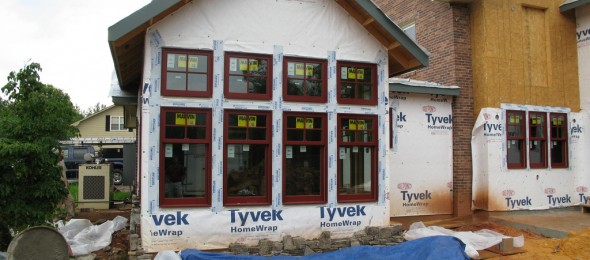The United States Court of Appeals for the Fifth Circuit has refused to order an insurance company to pay an arbitral award in a construction defect case. In Crownover v. Mid-Continent Casualty Co., No. 11-10166 (5th Cir. June 27, 2014), a married couple, the Crownovers, entered into a contract with a construction company, Arrow, to build a home on their property located in Sunnyvale, Texas. The agreement included a warranty clause which stated Arrow would repair any inadequately performed work that failed to conform to the requirements enumerated in the parties’ construction contract. A few months after the home was completed, the foundation and walls began to crack. Other problems related to the residential heating, ventilation, and air conditioning system also arose which apparently caused the system to run continuously. The Crownovers eventually spent hundreds of thousands of dollars to repair the alleged construction defects.
After Arrow refused to correct the issues in the Crownovers’ home, the couple sent the company a number of demand letters. Because the letters resulted in no relief, the Crownovers initiated arbitral proceedings with Arrow. Arrow claimed the couple’s breach of an express warranty to repair claim against the construction company was barred by the statute of limitations. The arbitrator disagreed and awarded the Crownovers damages based on that specific contract provision.
Following arbitration, Arrow filed for bankruptcy protection and a bankruptcy court limited the Crownovers’ recovery to any funds that could be collected from Arrow’s insurer, Mid-Continent. Mid-Continent refused to pay the damages award based upon several policy exclusions. In response, the couple sued Mid-Continent for breach of contract in federal district court. The insurance company filed a motion for summary judgment due to a contractual liability exclusion included in Arrow’s insurance policy. The trial court granted Mid-Continent’s motion.
According to the district court, the arbitrator based his award on the breach of an express warranty to repair provision that was excluded without an applicable exception in the insurance policy at issue. The trial court also held that an express warranty regarding the workmanship of a construction project superseded any implied warranty. The Crownovers asked the court to amend its verdict or order a new trial. The trial court declined to do so and the coupled filed an appeal with the Fifth Circuit.
The Court of Appeals affirmed the decision of the district court and held,
In light of the Texas Supreme Court’s controlling analysis in Gilbert, and further explication in Ewing, we conclude that Mid-Continent has demonstrated that an exclusion to coverage applies and that the Crownovers have failed to show that an exception to that exclusion applies. We also conclude that the district court committed no error in granting summary judgment for Mid-Continent.
The Fifth Circuit continued,
The district court did not err in concluding that Mid-Continent had demonstrated that the contractual-liability exclusion applies. The arbitrator found in favor of the Crownovers, concluding that Arrow had breached the express warranty to repair contained in paragraph 23.1 of the contract. That paragraph—which is virtually indistinguishable from the contract provision in Gilbert that the Texas Supreme Court determined “extend[ed] beyond Gilbert’s obligations under general law and incorprate[d] contractual standards to which Gilbert obligated itself,” see 327 S.W.3d at 122, 127—obligated Arrow to “promptly correct work … failing to conform to the requirements of the Contract Documents.” Whereas contractually agreeing to repair damage resulting from a failure to exercise reasonable care in performing the work or agreeing to perform work in a good and workmanlike manner would mirror a contractor’s duty under general law, see Ewing, 420 S.W.3d at 37-38; Gilbert, 327 S.W.3d at 127, contractually agreeing to repair damage resulting from a failure to comply with the requirements of the contract would not, see Gilbert, 327 S.W.3d at 127. We therefore conclude that Mid-Continent has demonstrated that the contractual-liability exclusion applies.
Next, the appeals court stated the Crownovers failed to demonstrate an exception to the liability exclusion included in the policy at issue applied in the case. The court continued,
… Here, the only ground on which the arbitrator awarded damages to the Crownovers was the breach of the express warranty to repair contained in paragraph 23.1, which was part of Arrow’s contractually assumed liability. Furthermore, the Crownovers’ argument on this point depends on the premise that the arbitrator awarded damages based on paragraph 14.4 and, as previously explained, she did not. Accordingly, the exception does not apply. See id. at 134 (“Gilbert asserts no other basis for its settlement than the breach of contract claim; thus, Gilbert’s settlement payment for which it seeks indemnity simply was not a liability for damages it had apart from its contract with DART, as it must have been in order for the … exception to apply.”).
Additionally, the Crownovers’ argument fails because the implied warranty of good workmanship was superseded by the express warranty of good workmanship. In Beucher, the Texas Supreme Court has held that “the parties’ agreement may supersede the implied standard for workmanship [and thus] the implied warranty of good workmanship may be disclaimed by the parties when their agreement provides for the manner, performance or quality of the desired construction.” 95 S.W.3d at 274-75. The Crownovers have failed to articulate any reason why the express warranty here fails to meet this requirement.
Finally, the Fifth Circuit Court of Appeals held that the district court did not commit error when it granted summary judgment in favor of the insurer.
Photo credit: Brock Builders / Foter / Creative Commons Attribution 2.0 Generic (CC BY 2.0)














